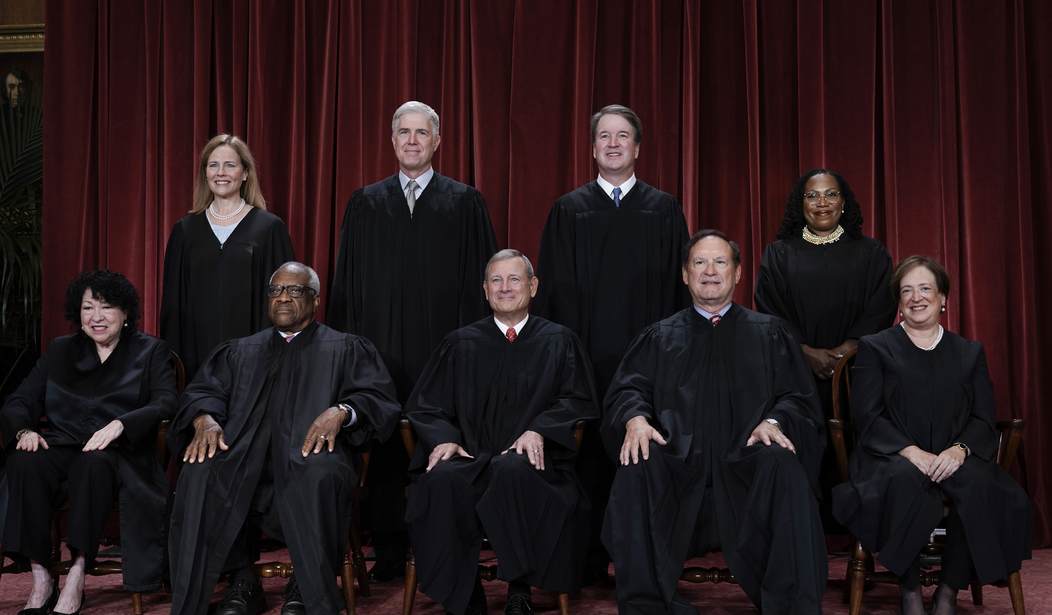On their last day of the term, the Supreme Court found unanimity at last — but it didn’t last long. Joe Biden’s student-loan forgiveness plan had two challenges, one from states and another from borrowers. The court dispensed with the latter without dissent on standing.
However, the challenge from Missouri qualified for standing, and that allowed the court to rule on Biden’s $430 billion self-appropriation. Writing for a 6-3 majority along the usual lines, Chief Justice John Roberts roasted Biden’s attempt to hijack the HEROES Act and usurp Congress’ legislative role in the power of the purse.
First, though, Roberts gave a clear explanation of Missouri’s standing to challenge:
Under the Secretary’s plan, roughly half of all federal borrowers would have their loans completely discharged. App. 119. MOHELA could no longer service those closed accounts, costing it, by Missouri’s estimate, $44 million a year in fees that it otherwise would have earned under its contract with the Department of Education. Brief for Respondents 16. This financial harm is an injury in fact directly traceable to the Secretary’s plan, as both the Government and the dissent concede. See Tr. of Oral Arg. 18; post, at 5 (KAGAN, J., dissenting).
The plan’s harm to MOHELA is also a harm to Missouri. MOHELA is a “public instrumentality” of the State. Mo. Rev. Stat. §173.360. Missouri established the Authority to perform the “essential public function” of helping Missourians access student loans needed to pay for college. Ibid.; see Todd v. Curators of University of Missouri, 347 Mo. 460, 464, 147 S. W. 2d 1063, 1064 (1941) (“Our constitution recognizes higher education as a governmental function.”). …
By law and function, MOHELA is an instrumentality of Missouri: It was created by the State to further a public purpose, is governed by state officials and state appointees, reports to the State, and may be dissolved by the State. The Secretary’s plan will cut MOHELA’s revenues, impairing its efforts to aid Missouri college students. This acknowledged harm to MOHELA in the performance of its public function is necessarily a direct injury to Missouri itself.
As for the HEROES Act argument, Roberts scoffs generally before getting into specifics. First off, the executive branch cannot just rewrite statutes for their own purposes:
The Secretary asserts that the HEROES Act grants him the authority to cancel $430 billion of student loan principal. It does not. We hold today that the Act allows the Secretary to “waive or modify” existing statutory or regulatory provisions applicable to financial assistance programs under the Education Act, not to rewrite that statute from the ground up.
The HEROES Act authorizes the Secretary to “waive or modify any statutory or regulatory provision applicable to the student financial assistance programs under title IV of the [Education Act] as the Secretary deems necessary in connection with a war or other military operation or national emergency.” 20 U. S. C. §1098bb(a)(1). That power has limits. To begin with, statutory permission to “modify” does not authorize “basic and fundamental changes in the scheme” designed by Congress. MCI Telecommunications Corp. v. American Telephone & Telegraph Co., 512 U. S. 218, 225 (1994). Instead, that term carries “a connotation of increment or limitation,” and must be read to mean “to change moderately or in minor fashion.” Ibid. That is how the word is ordinarily used. See, e.g., Webster’s Third New International Dictionary 1952 (2002) (defining “modify” as “to make more temperate and less extreme,” “to limit or restrict the meaning of,” or “to make minor changes in the form or structure of [or] alter without transforming”). The legal definition is no different. Black’s Law Dictionary 1203 (11th ed. 2019) (giving the first definition of “modify” as “[t]o make somewhat different; to make small changes to,” and the second as “[t]o make more moderate or less sweeping”). The authority to “modify” statutes and regulations allows the Secretary to make modest adjustments and additions to existing provisions, not transform them.
The proposal doesn’t just transform existing provisions, Roberts later writes. It creates an entirely new program, divorced from any statutory authority:
The Secretary’s new “modifications” of these provisions were not “moderate” or “minor.” Instead, they created a novel and fundamentally different loan forgiveness program. The new program vests authority in the Department of Education to discharge up to $10,000 for every borrower with income below $125,000 and up to $20,000 for every such borrower who has received a Pell Grant. 87 Fed. Reg. 61514. No prior limitation on loan forgiveness is left standing. Instead, every borrower within the specified income cap automatically qualifies for debt cancellation, no matter their circumstances. The Department of Education estimates that the program will cover 98.5% of all borrowers. See Dept. of Ed., White House Fact Sheet: The Biden Administration’s Plan for Student Debt Relief Could Benefit Tens of Millions of Borrowers in All Fifty States (Sept. 20, 2022). From a few narrowly delineated situations specified by Congress, the Secretary has expanded forgiveness to nearly every borrower in the country. …
The Secretary’s comprehensive debt cancellation plan cannot fairly be called a waiver—it not only nullifies existing provisions, but augments and expands them dramatically. It cannot be mere modification, because it constitutes “effectively the introduction of a whole new regime.” MCI, 512 U. S., at 234. And it cannot be some combination of the two, because when the Secretary seeks to add to existing law, the fact that he has “waived” certain provisions does not give him a free pass to avoid the limits inherent in the power to “modify.” However broad the meaning of “waive or modify,” that language cannot authorize the kind of exhaustive rewriting of the statute that has taken place here.6
Roberts also takes issue with Kagan’s accusation in the dissent that this represents an arrogation of authority of the judiciary over the executive branch. Right problem, wrong players, Roberts responds:
The dissent is correct that this is a case about one branch of government arrogating to itself power belonging to another. But it is the Executive seizing the power of the Legislature. The Secretary’s assertion of administrative authority has “conveniently enabled [him] to enact a program” that Congress has chosen not to enact itself. West Virginia, 597 U. S., at ___ (slip op., at 27). Congress is not unaware of the challenges facing student borrowers. “More than 80 student loan forgiveness bills and other student loan legislation” were considered by Congress during its 116th session alone. M. Kantrowitz, Year in Review: Student Loan Forgiveness Legislation, Forbes, Dec. 24, 2020.8 And the discussion is not confined to the halls of Congress. Student loan cancellation “raises questions that are personal and emotionally charged, hitting fundamental issues about the structure of the economy.” J. Stein, Biden Student Debt Plan Fuels Broader Debate Over Forgiving Borrowers, Washington Post, Aug. 31, 2022.
This entire issue clearly falls under the major-questions doctrine as well, Roberts argued. The scope and the cost of this plan makes that obvious to everyone but the three justices that would have allowed it, apparently. Roberts isn’t terribly impressed with their rebuttal on that point either:
Aside from reiterating its interpretation of the statute, the dissent offers little to rebut our conclusion that “indicators from our previous major questions cases are present” here. Post, at 15 (BARRETT, J., concurring). The dissent insists that “[s]tudent loans are in the Secretary’s wheelhouse.” Post, at 26 (opinion of KAGAN, J.). But in light of the sweeping and unprecedented impact of the Secretary’s loan forgiveness program, it would seem more accurate to describe the program as being in the “wheelhouse” of the House and Senate Committees on Appropriations. Rather than dispute the extent of that impact, the dissent chooses to mount a frontal assault on what it styles “the Court’s made-up major questions doctrine.” Post, at 29–30. But its attempt to relitigate West Virginia is misplaced. As we explained in that case, while the major questions “label” may be relatively recent, it refers to “an identifiable body of law that has developed over a series of significant cases” spanning decades. West Virginia, 597 U. S., at ___ (slip op., at 20). At any rate, “the issue now is not whether [West Virginia] is correct. The question is whether that case is distinguishable from this one. And it is not.” Collins v. Yellen, 594 U. S. ___, ___ (2021) (KAGAN, J., concurring in part and concurring in judgment) (slip op., at 2).
Near the end, Roberts explicitly gets to the core of the issue — the constitutional authority of appropriations. I raised this point early and often after Biden’s announcement of this program last year. An executive branch that can cut its own checks in this manner is an executive branch that will eventually become tyrannical and uncontrolled by either Congress or the judiciary.
Roberts agrees:
Among Congress’s most important authorities is its control of the purse. U. S. Const., Art. I, §9, cl. 7; see also Office of Personnel Management v. Richmond, 496 U. S. 414, 427 (1990) (the Appropriations Clause is “a most useful and salutary check upon profusion and extravagance” (internal quotation marks omitted)). It would be odd to think that separation of powers concerns evaporate simply because the Government is providing monetary benefits rather than imposing obligations. As we observed in West Virginia, experience shows that major questions cases “have arisen from all corners of the administrative state,” and administrative action resulting in the conferral of benefits is no exception to that rule. 597 U. S., at ___ (slip op., at 17). In King v. Burwell, 576 U. S. 473 (2015), we declined to defer to the Internal Revenue Service’s interpretation of a healthcare statute, explaining that the provision at issue affected “billions of dollars of spending each year and . . . the price of health insurance for millions of people.” Id., at 485. Because the interpretation of the provision was “a question of deep ‘economic and political significance’ that is central to [the] statutory scheme,” we said, we would not assume that Congress entrusted that task to an agency without a clear statement to that effect. Ibid. (quoting Utility Air, 573 U. S., at 324). That the statute at issue involved government benefits made no difference in King, and it makes no difference here.
And finally, Roberts ends the majority opinion by rebuking politicians and commentators for undermining the legitimacy of the court, and abusing respectful dissents to do so:
It has become a disturbing feature of some recent opinions to criticize the decisions with which they disagree as going beyond the proper role of the judiciary. Today, we have concluded that an instrumentality created by Missouri, governed by Missouri, and answerable to Missouri is indeed part of Missouri; that the words “waive or modify” do not mean “completely rewrite”; and that our precedent— old and new—requires that Congress speak clearly before a Department Secretary can unilaterally alter large sections of the American economy. We have employed the traditional tools of judicial decisionmaking in doing so. Reasonable minds may disagree with our analysis—in fact, at least three do. See post, p. ___ (KAGAN, J., dissenting). We do not mistake this plainly heartfelt disagreement for disparagement. It is important that the public not be misled either. Any such misperception would be harmful to this institution and our country.
Amen to that. One suspects that this might have been a late and perhaps unanimous addition after the reaction yesterday to the decision to end affirmative action. On the other hand, it might have been inspired by the reaction to Dobbs, or pretty much any decision that didn’t go in favor of progressives.
As I predicted from the start, the real question here was standing. The Biden administration knew it too, and tried all sorts of manipulations to prevent courts from recognizing the standing of plaintiffs in these challenges. Missouri and MOHELA gave the Supreme Court just enough legitimate standing to put an end to Biden’s usurpation of Article I authority.








Join the conversation as a VIP Member